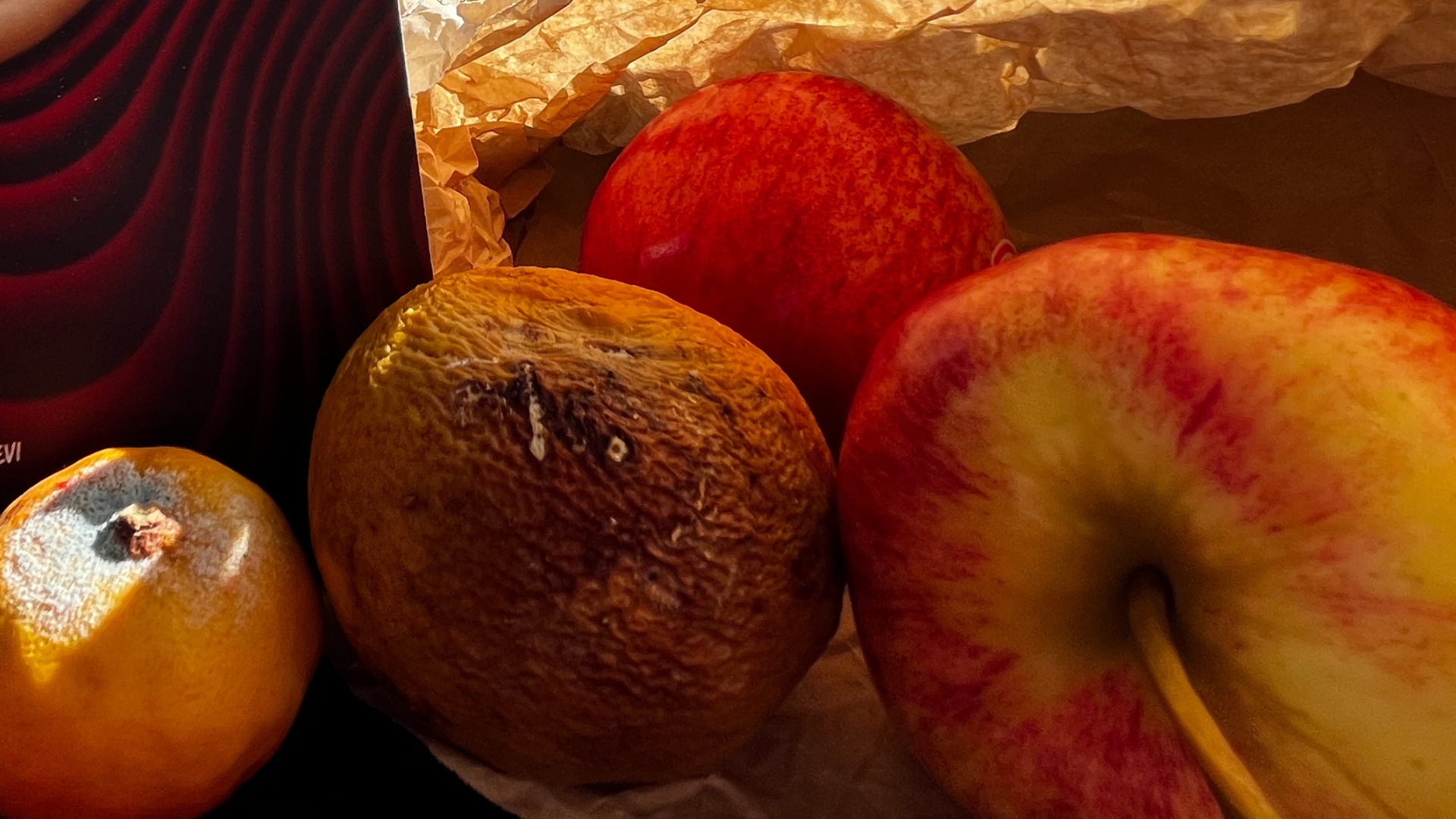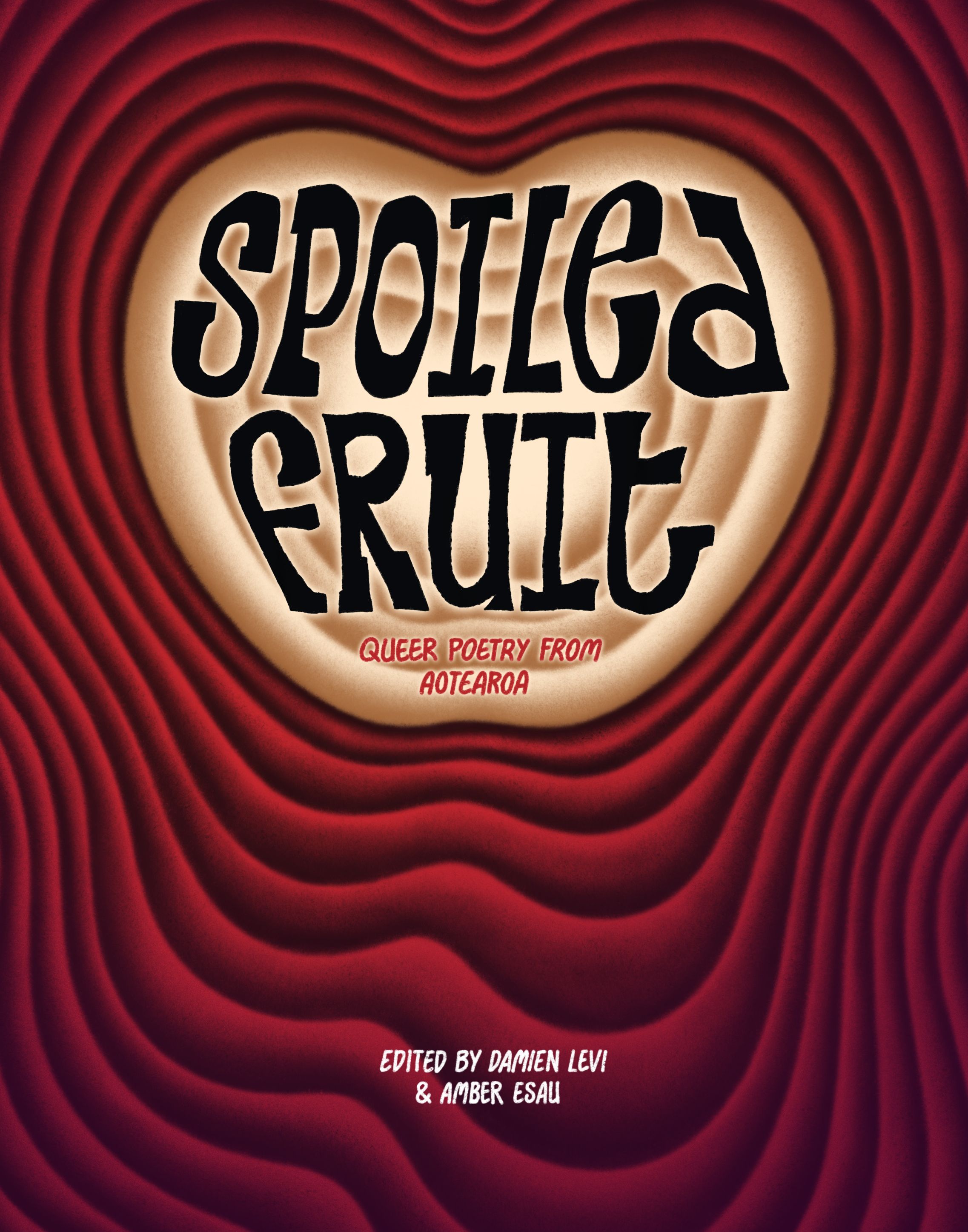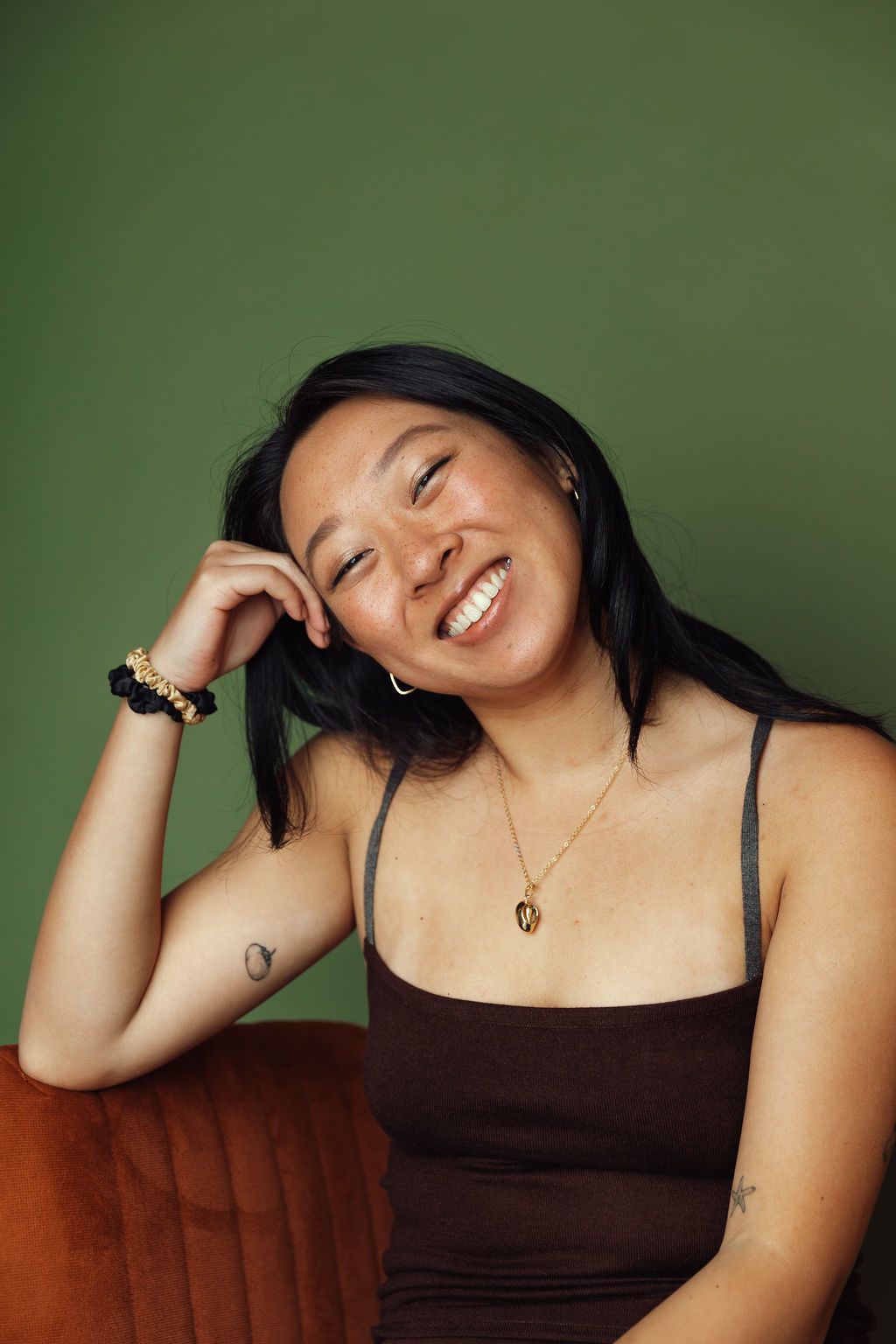Juicy Spoiled Fruit!
The debut poetry anthology from the newest and naughtiest micro press out there, Āporo Press. Damien Levi, one of the co-editors of the collection with Amber Esau, shares his dreams for queer and takatāpui publishing in Aotearoa.
'Spoiled Fruit: Queer Poetry From Aotearoa' launch party.
Thursday 9th, 8-10pm at Meow.
Verb Readers and Writers Festival in Wellington.
More details here.
Upstairs at Samoa House Library, on Karangahape Road, Spoiled Fruit: Queer Poetry from Aotearoa held its soft launch in Tāmaki Makaurau on October 27th. Damien Levi (Te Ātihaunui-a-Pāpārangi) and Amber Esau (Ngāpuhi/ Manase), co-editors of the debut poetry collection from Āporo Press, greeted attendees at the door - surrounded by piles of their pukapuka - perfectly sized and delectable treats covered in glossy red.
Spoiled Fruit is an anthology including 20 Queer writers across Aotearoa. The first section of the collection includes works first published on bad apple, a volunteer-run online literary journal focused on writing from LGBTQ+ and takatāpui writers. Poets were prompted to reflect on their works to create new pieces for the second section ‘Spoiled Fruit’ - bringing forth themes of growth, evolution, change and transition through the rot.
‘Spoiled Fruit’ - bringing forth themes of growth, evolution, change and transition through the rot.
It was a night I’d remember. Not just because I had embarrassed myself and dropped a 1L bottle of apple juice all over my pants before the show. But because the voices of the poets who’d performed at Samoa House Library would continue to haunt me as I read through the anthology.
Like Ivy Lyden-Hancy - whose poems on eating fish in biblical proportions were witty, charming and damming. Jo Bragg’s ‘Heaven is a Blue Room,’ holds imagery that reveals new depths with each listen. Spoken word poet Ngaio Simmons’s performance of “Whati,’ - reverberates around the walls and fills the library with the resilience of being wāhine maōri. Amy Marguerite performs ‘action potential,’ in a way that honours the rhythm and spacing with sighs and pauses to create delight! While El Spurlock – whose poem ‘OTHER BOYS ARE BORING AND YOU ARE A BURNING HOUSE I WANT TO LIVE IN’ – starts with taking the wrong exit at Greenlane roundabout and devastates us in just ten lines. Oh, and Laura Vincent, who I’m likely to become a rabid fangirl of and get ‘how many chewable vitamin Cs can I eat before I forget the taste of real fruit?’ tattooed on one tit, and ‘EVER GIVEN 2021’ on the other. And kī anthony! Their poetry is the first in the anthology, and sets the scene with ‘we saw carly rae jepsen in concert when concerts existed and dedicated side b didn’t exist yet’ — capturing the yearning, romance, and collapsing in melodrama while living in a mouldy, fuzzy, mozzie filled whare in West Auckland.
This is all to say - Spoiled Fruit’s grand launch at Verb Festival on the 9th of November will be filled with an equally impressive line-up of performing poets. Before the launch party, I called Damien Levi, editor of bad apple, co-editor of Spoiled Fruit, and founder of micro-publishing house Āporo Press, to learn more about the project.
Co-editors of Spoiled Fruit: Queer Poetry from Aotearoa (Left: Damien Levi, Right: Amber Esau)
How long has Spoiled Fruit been cooking away?
Spoiled Fruit has been in the works for over a year now. It was conceptualised towards the end of 2022. I impulsively applied for some funding from the Copyright Licensing New Zealand contestable fund and was lucky enough to get $7,000 to kick it off. It's great to finally have a physical book to show people.
How has it been having boxes of the pukapuka at your flat, holding it in your hands… and smelling it?
To be honest, I'm a little bit over it. [laughs] Look, I've had it on my computer and I've been working on it for a year!
But to have the physical thing is really cool! I haven't really looked inside it very well yet. I'm sure people will tell me if there's anything wrong!
I'm so glad we were able to platform these writers and publish them. It's like we've given these works a new life. We’ve been able to pay people to do it, which is always a nice feeling.
What's the origin story of bad apple?
There was a bit of stuff in the news in late 2021 towards Queer people that was less than ideal. And so a group of like-minded individuals tired of this misrepresentation and outright slander decided to come together to find an alternative. There hadn't really been any platforms for queer poetry in the digital space before that, except for eel mag (run by Shania Pablo, Nathan Joe and Lily Holloway).
So we decided, let's do it! Let's make our own space where we can tell our own stories and so in May 2022, the website was born.
It's not really about the numbers for us. It's just about having space to platform people.
Who’s been involved in developing bad apple and helping you out?
In the very beginning, the main person who started the conversations was Mari Toledo, who we’ve published since then, but has since stepped back from bad apple. They were instrumental in its foundation.
We also had Sloane Hong, an illustrator and comic artist, who did all the design for bad apple. Iris and kī anthony, a poet and tech person who does things that I don't understand to make the website work — they collaborated to build the website, which was no easy thing. Those two were really instrumental in bringing it to life. These days, it’s mostly me running the show as the lead editor.
We had some consistent collaborators, like kate aschoff, harold coutts, Kyra Lawler, Devon Webb, who have helped us out with releases this year. There are a lot of folks that help make our events. Otherwise, I don't think anything would happen.
The community is really really strong, I’ve noticed at your events, you can feel the love in the room!
It's been a unifying place, which is interesting because we don't track any kind of stats about who's looking at the website. We don't record anything for digital privacy reasons. So I never really know — what are people getting into? How many people are looking at the website? Who's reading? Because it's not really about the numbers for us. It's just about having space to platform people.
How did Āporo Press begin?
Āporo Press is my baby. It's what I've always wanted to do. I was working in publishing and felt a need for more independent publishing of minority writers in Aotearoa. So I took this opportunity to do this book and set up Āporo Press as its own thing.
bad apple has more of a fixed kaupapa around being volunteer-run and publishing everything that gets submitted to us. Contributors aren't paid for it, and all the behind-the-scenes work — editors and people setting up the events — aren’t paid either. We’d like to keep it that way because if money gets involved, then we start being a bit more selective about who we publish. Then the idea of being a place to platform Queer writers, from emerging writers to the poet laureate, disappears.
So Āporo Press is a chance to make a little bit of money, but also help develop my publishing career a bit. It all came about thanks to bad apple, so that's why the names are tied together.
Āporo Press is my baby. It's what I've always wanted to do.
What have you noticed from having worked in mainstream publishing, and now running your own independent publishing press?
Mainstream publishing produces a lot of books that I really love. But it's quite limited in who and what they're publishing because of the financial considerations. It’s tricky.
These big overseas overlords see NZ’s publishing industry as a tiny speck on the far horizon, but it's everything to us. These are the stories of Aotearoa, and of who we are.
But if we only get one or two books a year from a major publisher by minority groups, then we're not present in the conversation. I think it's the small independent publishers that are covering that base and doing the hard work.
I look to these small, independent publishers, like Tender Press, Dead Bird Books and Saufo’i Press, that started as a reaction to the lack of something in the market.
Saufo’i publishes poetry from the Pacific, while Tender Press has covered people with disabilities and stories from immigrants. They’re covering groups I don't see typically coming out of big publishers and I appreciate the work that they're doing.
If we only get one or two books a year from a major publisher by minority groups, then we're not present in the conversation. I think it's the small independent publishers that are covering that base and doing the hard work.
What made you want to get into publishing?
Yeah, there is a lot to unpack there. I originally studied journalism, so I had a background in writing adjacent circles. But immediately after graduating, I decided I didn't want to do journalism because I didn't like telling other people's stories for them.
I went gallivanting around a little bit and I lived in Japan for a little while. I was editing a community English-language magazine for immigrant and migrant workers — most of them were English teachers. I was bringing skills back out after almost a decade of them not being used.
When I moved back to New Zealand, I didn’t want to go back into my previous line of work in E-commerce. I didn’t feel like I was contributing anything significant to the world. I'd much rather help in the facilitation and creation of art in some way. So I was thinking, how can I do that? I've got these skills and I really love books.
That's when I discovered the Whitireia publishing diploma. And I had just finished reading Rebecca K Riley's Greta & Valdin, which is one of my favourite books! And I was like, hell yeah! This is a queer wāhine Māori telling stories about queer Māori people, I want to be involved in this! I want to be doing this! And so that kind of one thing led to another and here I am.
You’re not often reading a poetry book from cover to cover, right? But with how Spoiled Fruit is structured, it makes you want to.
How has it been working with Amber for Spoiled Fruit?
Amber is a genius, especially with her editorial input. She has such a strong poetic sense. I couldn't have done this book alone. I don't consider myself to be poetic-minded when I think about editing. I am quite a literal writer and literal-minded, so I’m not sure how to approach the poetic form when ideas are a little more abstract. Amber has been really a great person to collaborate with because she just gets it. She pulls the best out from the work.
You’re not often reading a poetry book from cover to cover, right? But with how Spoiled Fruit is structured, it makes you want to — that's all Amber’s narrative thread. The poems can be quite starkly different but they tie into each other so well, you want to see where things are going.
It’s like listening to albums before we started skipping songs.
Yeah, the best albums I love are highly considered! They build a story or a narrative, song to song. This poetry collection does the same thing.
Final question. What's your favourite kind of Apple?
Um, I actually don't really like apples. Not in a standard fruit form. My mum makes apple crumble with French vanilla ice cream and that is probably one of my top 10 favourite desserts. When I was younger, I used to lean towards Granny Smith apples. Love the colour. Love a little tangy sour action. I'm just so scared about red apples because I never know if it’s going to be floury or bad.
And brands like Fuji apple or whatever. I can never tell — It’s so ambiguous as to the vibe of the apple. You call it Fuji? Is that crunchy? Is that juicy? Please name apples after more literal things.
Spoiled Fruit: Queer Poetry from Aotearoa (front cover)



